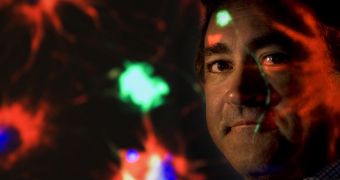In the near future, the neural damage that radiotherapy causes in patients suffering from brain cancer could be repaired using human neural stem cells. The conclusion belongs to a new study conducted by investigators at the University of California in Irvine (UCI).
The research suggests that transplanting stem cells into the brain can allow cancer sufferers to regain at least some of the learning and memory abilities that they lose during radiotherapy. These are known side-effects of the procedure, and patients are aware of them when they begin radiotherapy.
At this time, radiotherapy and chemotherapy are the main ways in which cancer is treated. In the future, it may be possible to use nanotechnology and regenerative medicine to address these diseases, but for now people are stuck with using treatments that cause a lot of damage themselves.
What the UCI research does is it suggest a possible mechanism of mitigating at least some of the negative side-effects these approaches have on the body. In experiments conducted at the university, the team transplanted stem cells in the brains of lab rats two days after cranial irradiation.
The group then analyzed how the rodents evolved, and saw that cognitive functions were restored for the most part, in as little as one to four months after the original intervention. No cognitive improvements were identified in irradiated rats that were not injected with stem cells.
Details of the research effort appear in a paper published in the July 15 issue of Cancer Research, a journal edited by the American Association for Cancer Research (AACR). This study provides an avenues for improving the quality of life of cancer survivors.
“Our findings provide solid evidence that such cells can be used to reverse radiation-induced damage of healthy tissue in the brain. In almost every instance, people experience severe cognitive impairment that’s progressive and debilitating,” says Charles Limoli.
“Pediatric cancer patients can experience a drop of up to three IQ points per year,” adds the expert, who holds an appointment as a radiation oncology professor at the university. He and his team used multipotent human neural stem cells for this research.
After they were injected in the brain of rats, the cells migrated all over a brain area called the hippocampus, which previous studies identified as playing a key role in growing new neurons.
It is also responsible for the formation and storage of new long-term memories. When the stem cells reached this area, they settled down, and immediately started forming new neurons, which contributed to improving rats' cognitive skills.
“This research suggests that stem cell therapies may one day be implemented in the clinic to provide relief to patients suffering from cognitive impairments incurred as a result of their cancer treatments,” Limoli explains.
“While much work remains, a clinical trial analyzing the safety of such approaches may be possible within a few years, most likely with patients afflicted with glioblastoma multiforme, a particularly aggressive and deadly form of brain cancer,” he concludes.

 14 DAY TRIAL //
14 DAY TRIAL //